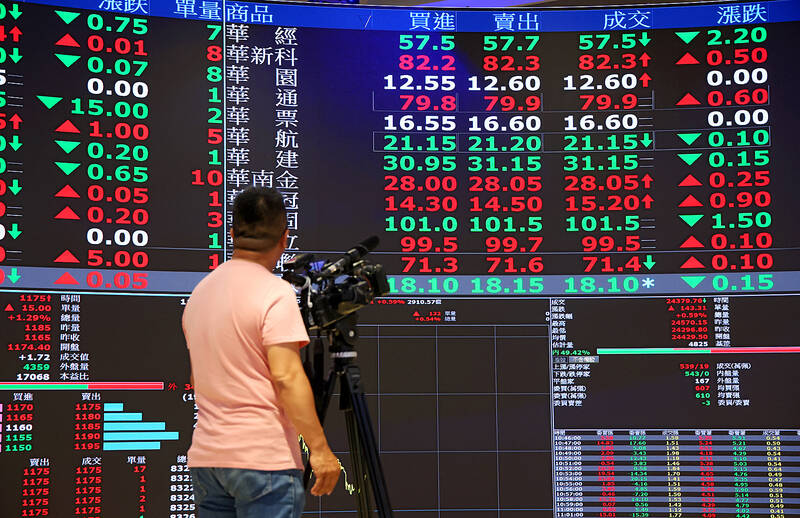Taiwanese equities extended their record-setting streak yesterday, driven by gains in the semiconductor and technology-related sectors, while broader optimism across Asia provided additional momentum.
The TAIEX rose 0.22 percent, or 52.8 points, to close at a record 24,547.38, supported by strong demand for artificial intelligence (AI) supply-chain stocks and semiconductor suppliers.
Markets in Japan, South Korea, Hong Kong and China also ended higher, reinforcing confidence in Taiwan’s export-driven economy, even as Wall Street slipped on weaker-than-expected US employment data.

Photo: CNA
Taiwan Semiconductor Manufacturing Co (TSMC, 台積電) closed flat, as profit-taking trimmed earlier gains. Buying rotated to other semiconductor heavyweights, such as integrated circuit (IC) packaging and testing service provider ASE Technology Holding Co (日月光投控), which soared 10 percent.
The disappointing US employment data released on Friday boosted expectations that the US Federal Reserve might cut interest rates at its policy meeting this month, which lent further support to Taiwan’s stock market, as total trading volume reached NT$433.558 billion (US$14.2 billion) yesterday, Taiwan Stock Exchange (TWSE) data showed.
The top five most-actively traded stocks all rose, led by Winbond Electronics Corp (華邦電) and Nanya Technology Corp (南亞科技). Winbond’s increase was bolstered by AI-related demand and an “outperform” rating from Morgan Stanley, keeping investor appetite high, while Nanya benefited from robust DRAM demand.
Foreign institutional investors were the main drivers behind the record rally, buying NT$14.62 billion of Taiwanese shares on the local main board, while proprietary traders added NT$2.6 billion, reflecting a mix of hedging and active trading strategies, TWSE data showed.
Fund houses bucked the trend, offloading NT$1.08 billion and marking their 10th consecutive day as net sellers.
Looking ahead, President Capital Management Co (統一投顧) highlighted several factors that could continue to support Taiwanese stocks, such as Apple Inc’s upcoming product launch and potential relief from US tariffs, as a lower court has questioned their legality.
The opening of Semicon Taiwan this week and OpenAI’s projections for a surge in AI-related spending are expected to provide further tailwinds.
Semicon Taiwan is scheduled to open tomorrow at the Taipei Nangang Exhibition Center, featuring a wide range of AI chips, advanced IC assembly and testing services, and fan-out panel-level packaging technologies, event organizer SEMI said.
Allianz Global Investors Taiwan (安聯投信) said that although the market has reached elevated levels and could face seasonal volatility, medium to long-term prospects remain favorable, given solid fundamentals, rising corporate capital expenditure and sustained AI-related demand.

With this year’s Semicon Taiwan trade show set to kick off on Wednesday, market attention has turned to the mass production of advanced packaging technologies and capacity expansion in Taiwan and the US. With traditional scaling reaching physical limits, heterogeneous integration and packaging technologies have emerged as key solutions. Surging demand for artificial intelligence (AI), high-performance computing (HPC) and high-bandwidth memory (HBM) chips has put technologies such as chip-on-wafer-on-substrate (CoWoS), integrated fan-out (InFO), system on integrated chips (SoIC), 3D IC and fan-out panel-level packaging (FOPLP) at the center of semiconductor innovation, making them a major focus at this year’s trade show, according

DEBUT: The trade show is to feature 17 national pavilions, a new high for the event, including from Canada, Costa Rica, Lithuania, Sweden and Vietnam for the first time The Semicon Taiwan trade show, which opens on Wednesday, is expected to see a new high in the number of exhibitors and visitors from around the world, said its organizer, SEMI, which has described the annual event as the “Olympics of the semiconductor industry.” SEMI, which represents companies in the electronics manufacturing and design supply chain, and touts the annual exhibition as the most influential semiconductor trade show in the world, said more than 1,200 enterprises from 56 countries are to showcase their innovations across more than 4,100 booths, and that the event could attract 100,000 visitors. This year’s event features 17

EXPORT GROWTH: The AI boom has shortened chip cycles to just one year, putting pressure on chipmakers to accelerate development and expand packaging capacity Developing a localized supply chain for advanced packaging equipment is critical for keeping pace with customers’ increasingly shrinking time-to-market cycles for new artificial intelligence (AI) chips, Taiwan Semiconductor Manufacturing Co (TSMC, 台積電) said yesterday. Spurred on by the AI revolution, customers are accelerating product upgrades to nearly every year, compared with the two to three-year development cadence in the past, TSMC vice president of advanced packaging technology and service Jun He (何軍) said at a 3D IC Global Summit organized by SEMI in Taipei. These shortened cycles put heavy pressure on chipmakers, as the entire process — from chip design to mass

SEMICONDUCTOR SERVICES: A company executive said that Taiwanese firms must think about how to participate in global supply chains and lift their competitiveness Taiwan Semiconductor Manufacturing Co (TSMC, 台積電) yesterday said it expects to launch its first multifunctional service center in Pingtung County in the middle of 2027, in a bid to foster a resilient high-tech facility construction ecosystem. TSMC broached the idea of creating a center two or three years ago when it started building new manufacturing capacity in the US and Japan, the company said. The center, dubbed an “ecosystem park,” would assist local manufacturing facility construction partners to upgrade their capabilities and secure more deals from other global chipmakers such as Intel Corp, Micron Technology Inc and Infineon Technologies AG, TSMC said. It